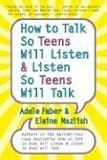It's not you, it's us: Parent - teen relationships are a two-way street
 We recently talked about parenting styles on Episode 67 of The Family Anatomy Podcast, but although "parenting" is the widely accepted term, it simplifies the parent-child relationship into something the adult does to (or hopefully for) the child. It's clearly more complicated than that - how parents deal with their kids depends on the parent, the child, and the situation. New resaerch published in the July issue of Developmental Psychology suggests that the quality of the relationship between parents and their teens can be predicted by the personalities of both the parent and the youth.
Researchers surveyed nearly 300 two-parent families with two children between the ages of 11 and 16. The families were followed for 3 years, with ratings of parent-child relationship (referred to, in typical psychologist fashion, as the PCR) quality and personality completed annually by all family members. As we discussed in the podcast, the PCR was examined based on two dimensions: warmth and restrictive control. The latter dimension is similar to demandingness in that it refers to attempts to constrain behaviour and goals.
We recently talked about parenting styles on Episode 67 of The Family Anatomy Podcast, but although "parenting" is the widely accepted term, it simplifies the parent-child relationship into something the adult does to (or hopefully for) the child. It's clearly more complicated than that - how parents deal with their kids depends on the parent, the child, and the situation. New resaerch published in the July issue of Developmental Psychology suggests that the quality of the relationship between parents and their teens can be predicted by the personalities of both the parent and the youth.
Researchers surveyed nearly 300 two-parent families with two children between the ages of 11 and 16. The families were followed for 3 years, with ratings of parent-child relationship (referred to, in typical psychologist fashion, as the PCR) quality and personality completed annually by all family members. As we discussed in the podcast, the PCR was examined based on two dimensions: warmth and restrictive control. The latter dimension is similar to demandingness in that it refers to attempts to constrain behaviour and goals.
Characteristics of parents and youth were equally important in predicting warmth, but adolescents' personality was more strongly linked to restrictive control. Parents who were more outgoing (or extroverted) were more likely to have warm relationships with their teens. On the youth's side, teens who were more agreeable had warmer relationships with their parents.
Teens who were more agreeable were also less likely to have a controlling relationship with their parents; the strength of this link increased with age, possibly because older adolescents require less direction and supervision than younger teens do. Teens' conscientiousness, referring to a tendency towards goal-directed behaviour (what parents might call "responsibility"), was also linked to less controlling relationships with parents. Extroverted teens were less likely to report restrictive control in their relationships with their parents; the researchers surmised that the strong social skills associated with extroversion might allow the youth to negotiate rules and expectations, resulting in reduced conflict and restrictions. In contrast, teens who scored higher on openness described greater restrictive control in their relationship with their parents, possibly because of their greater willingness to experiment and test limits.
 So what does all this mean? It certainly emphasizes the need for parents and teens to work together to improve their relationships. Parents who are concerned about the overcontrolling nature of their relationships with their adolescent children (whether it's the teen or the parent who feels the need for control) probably would benefit not only from changing the way that they interact with their kids, but from involving the children in that change - remember, the teen's characteristics were more strongly related to control than the parents' were. We'll be talking about increasing independence on an upcoming episode of the podcast. And last, but not least, this article gives me another chance to plug one of my favourite parenting books: How to Talk So Teens Will Listen and Listen So Teens Will Talk!
So what does all this mean? It certainly emphasizes the need for parents and teens to work together to improve their relationships. Parents who are concerned about the overcontrolling nature of their relationships with their adolescent children (whether it's the teen or the parent who feels the need for control) probably would benefit not only from changing the way that they interact with their kids, but from involving the children in that change - remember, the teen's characteristics were more strongly related to control than the parents' were. We'll be talking about increasing independence on an upcoming episode of the podcast. And last, but not least, this article gives me another chance to plug one of my favourite parenting books: How to Talk So Teens Will Listen and Listen So Teens Will Talk!
You can read more about the Developmental Psychology study here.
Vote for The Family Anatomy Podcast at Podcast Alley and for the blog at Blogger’s Choice!
Note: Posts on Family Anatomy are for education only. If you need to talk to someone about family or mental health issues, you can get a referral from your family doctor.
